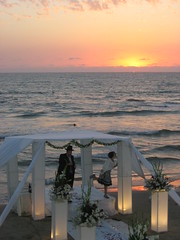When it's over, she may never have to pretend again. I will be very happy for her. I am guessing that Camille Paglia will not. In the NYT this weekend (on Pride Sunday, in fact, because Gray Lady editors have a sense of humor) she laments the fact that white men and white women have fused to become a sort of androgynous, asexual unit:
[A] new pill, despite its unforeseen side effects, is necessary to cure the sexual malaise that appears to have sunk over the country. ...Now, whose fault is it that being ladylike/gentlemanly is out and androgynous in? "[E]lite schools, with their ideological view of gender as a social construct." She calls them feeder cells, which is super cute because as you may know that's a label usually used for terrorists.
In the discreet white-collar realm, men and women are interchangeable, doing the same, mind-based work. Physicality is suppressed; voices are lowered and gestures curtailed in sanitized office space. Men must neuter themselves, while ambitious women postpone procreation. Androgyny is bewitching in art, but in real life it can lead to stagnation and boredom, which no pill can cure.
She goes on to explain that white folks are screwed up because our men and our women both look like boys, whereas the darker-skinned folks have a more "healthy" ideal:
[V]isually, American men remain perpetual boys, as shown by the bulky T-shirts, loose shorts and sneakers they wear from preschool through midlife. The sexes, which used to occupy intriguingly separate worlds, are suffering from over-familiarity, a curse of the mundane. There’s no mystery left. ... American actresses have desexualized themselves, confusing sterile athleticism with female power. Their current Pilates-honed look is taut and tense — a boy’s thin limbs and narrow hips combined with amplified breasts. Contrast that with Latino and African-American taste, which runs toward the healthy silhouette of the bootylicious Beyoncé.
Oh my god, Camille Paglia, have you lost your cotton-picking mind? Where is the proof of any of this? First and foremost: what sexual malaise? Seems to me like Americans are doing it early and often (and outside). The subset of Americans she is pounding on here, the educated bourgeoisie, is actually the most likely to have stable marriages. Wouldn't that probably be less true if men really did just feel like cogs in the domestic machine?
In Paglia's world, there don't seem to be any lesbians (mystifyingly, since she herself identifies as one). There are no folks who find gender-bending or androgyny titillating. There are, in fact, no real people at all, only figments of her imagination.
My friend Veronica put it best in a consolatory email she sent after reading the article:
Please let me express my condolences for your sexually suffocated marriage. You must just be killing Ben with your anxiety and ambition. And, my God, he probably has no idea what to do with your Venusian figure. What a shame. But, then again, I should probably question how I can be a Latina lesbian who prefers my girlfriend's broad shoulders to Beyonce's extra-yeasty double-rise curves.Extra-yeasty. I myself rather fit that description, being composed almost entirely of cleavage; it is hard for me to be as ladylike as I sometimes feel pulled to be. In those moments, though, I try to relax and think of Elena Kagan, not to mention Margaret Cho, Alison Bechdel, Victoria Woodhull, Michelle Obama, and everyone else who has made the world better by simply being who they are.




